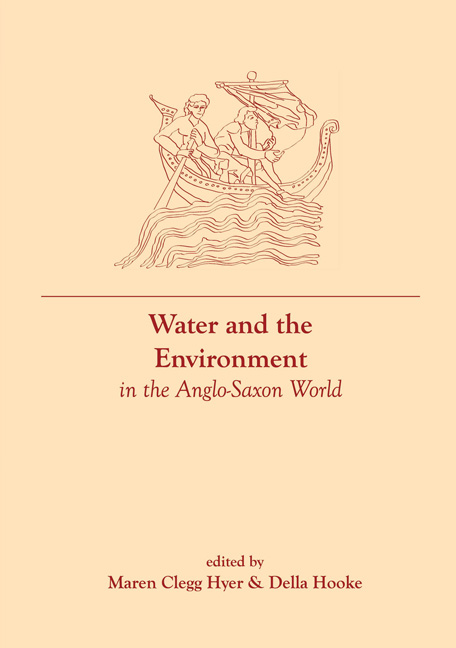Book contents
- Frontmatter
- Dedication
- Contents
- List of Illustrations
- List of Tables
- List of Contributors
- Introduction
- 1 From Whale's Road to Water under the Earth: Water in Anglo-Saxon Poetry
- 2 Water in the Landscape: Charters, Laws and Place Names
- 3 Fens and Frontiers
- 4 Marshlands and Other Wetlands
- 5 Rivers, Wells and Springs in Anglo-Saxon England: Water in Sacred and Mystical Contexts
- 6 Food from the Water: Fishing
- 7 Inland Waterways and Coastal Transport: Landing Places, Canals and Bridges
- 8 Watermills and Waterwheels
- 9 Water, Wics and Burhs
- Notes
- Suggested Reading
- Index
Introduction
- Frontmatter
- Dedication
- Contents
- List of Illustrations
- List of Tables
- List of Contributors
- Introduction
- 1 From Whale's Road to Water under the Earth: Water in Anglo-Saxon Poetry
- 2 Water in the Landscape: Charters, Laws and Place Names
- 3 Fens and Frontiers
- 4 Marshlands and Other Wetlands
- 5 Rivers, Wells and Springs in Anglo-Saxon England: Water in Sacred and Mystical Contexts
- 6 Food from the Water: Fishing
- 7 Inland Waterways and Coastal Transport: Landing Places, Canals and Bridges
- 8 Watermills and Waterwheels
- 9 Water, Wics and Burhs
- Notes
- Suggested Reading
- Index
Summary
As one of the essentials of life, water was never far away from early medieval consciousness. In Britain one was rarely far from a supply of water, which had many uses. Rivers and their drainage systems were to influence the territorial divisions of England, as will be shown below, offering inroads to vast areas of countryside. Rivers not only attracted settlement, but many were used for the transport of goods, although their courses may have been altered in subtle ways since this period. In a landscape in which man-made drainage was nowhere near as prevalent as it is today, wetlands and marshes were common and might provide pasture as well as act as habitats for water birds that might be taken as food. It was a regular supply of clean water that was essential for settlement, and although water could be drawn from rivers and streams, springs were particularly important sources. Archaeology sets out the material background of living at this time while the documentary records that survive provide insights as to how the Anglo-Saxons and sometimes, too, their predecessors, viewed the waterscapes in their environment.
The geography of Anglo-Saxon England: rivers and territories
The importance of rivers in the territorial delineation of the early Anglo-Saxon kingdoms has long been recognized. Many river valleys tended to run through the cores of emerging territories forming the hub of early Anglo-Saxon kingdoms and folk regions, although boundaries remained fluid until well into the seventh century. The Severn, for instance, upstream from its estuary in the Bristol Channel, flowing through what was to become Gloucestershire and Worcestershire, was the hub of the late Iron Age tribal kingdom of the Dobunni, a territory which underpinned the Anglo-Saxon kingdom of the Hwicce. What may be termed the northern part of a ‘North Sea Province’ included Bernicia and Deira in Northumbria. At its strongest, in the seventh century, Northumbria included not only the earlier units of Bernicia and Deira, but extended both northwards and also westwards across the Pennines, also taking in the former British kingdom of Elmet and extending southwards to include Lindesfarona (Lindsey).
- Type
- Chapter
- Information
- Water and the Environment in the Anglo-Saxon World , pp. 1 - 14Publisher: Liverpool University PressPrint publication year: 2017



